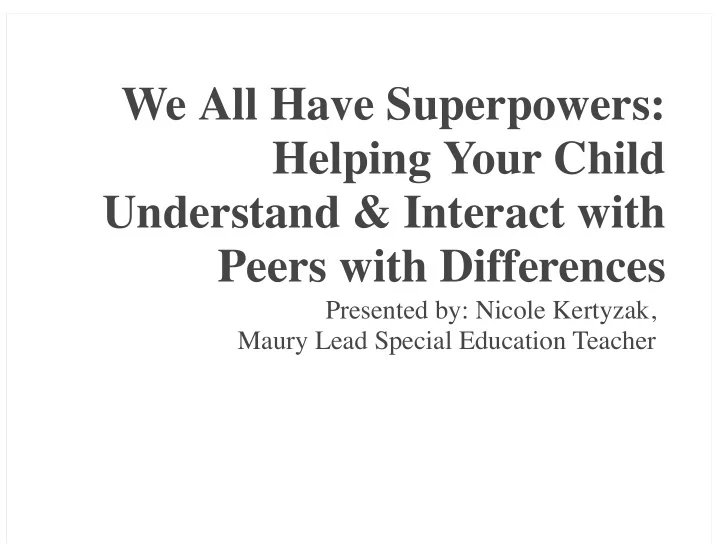

We All Have Superpowers: Helping Your Child Understand & Interact with Peers with Differences Presented by: Nicole Kertyzak, Maury Lead Special Education Teacher
Not All Disabilities are Visible • ADHD • Autism/Asperger’s • Learning disorders • Psychiatric conditions • Seizure disorders • Brain injury • Tourette’s syndrome • https://www.washington.edu/doit/videos/index.php? vid=36&t=1
All Students Have Different Strengths and Weaknesses • Academic ◦ Reading, writing, math, science, social studies, etc. • Behavior ◦ Time on task, independent work, hands to self, volume/tone/language, etc. • Social skills ◦ Initiating interactions, social communication, working/playing cooperatively, etc.
How to Support Your Child • Talk with your child about how no two people are the same; everyone has strengths and weaknesses.
How to Support Your Child • Remind him/her: Just because someone learns differently does not mean that they are unable to learn.
How to Support Your Child • Emphasize: All children want to be accepted and respected, no matter how they present in the classroom.
How to Support Your Child • Explain to her: Everyone gets what they need to learn. Some students may need additional time with an adult, have a special chart, or use another resource (e.g. tablet or calculator).
How to Support Your Child Role play and model empathetic responses Instead of labeling a classmate as “the bad kid,” help your child understand that • they sometimes people act out when they’re overwhelmed, struggling, or frustrated. A caring response from teachers and peers can make a big difference in the outcome. Instead of … Try… Thinking, “What a jerk.” Thinking, “Maybe my friend is sad or frustrated. How can I help?” Saying, “Teacher, Sam is Saying, “Teacher, we’re having some problems at bothering me.” our table. Can you help us work them out?” Staring or laughing at a Give your friend space. Later, when they’ve classmate who’s having a calmed down, ask if they want to play or work on meltdown an assignment together.
Books/Videos to Support Your Discussion with Your Child Younger Kids • Sesame Street- often includes children with disabilities in episodes; some characters have disabilities (e.g. Julia, a preschooler with autism)
Books/Videos to Support Your Discussion with Your Child Grades 1-3 • Issac and his Amazing Asperger Superpowers Discusses how every child has superpowers, they just look different for everyone (e.g., you might be great at math, but need help playing with your friends appropriately, whereas your classmate may be great with making friends but need help with math)
Books/Videos to Support Your Discussion with Your Child Grades 4-5 • Wonder- good chapter book about a student with physical disabilities and his experiences at school. Shows same experience from different perspectives.
Special Education Team • Special Education Administrator (Suzanne Hess) • Special Education Teachers ◦ Nicole Kertyzak (K-1) ◦ Janelle Freeman (2-3) ◦ Ambyr Hinton (4-5) • Special Education Paraprofessionals ◦ Da’Mon Smith ◦ Anna Spratt ◦ Kim Purce • Related Service Providers ◦ Speech Language Therapist (Kerry Corso) ◦ Occupational Therapist (Rebecca Rath) ◦ Physical Therapist (Mickie Monsheimer)
Recommend
More recommend